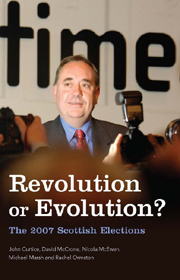Book contents
- Frontmatter
- Contents
- List of Tables
- Preface
- CHAPTER 1 A Watershed Election?
- CHAPTER 2 A Distinctive Scottish Voice? Identities, Values and Attitudes
- CHAPTER 3 What has Devolution Achieved? The Public's View
- CHAPTER 4 Governing Scotland: The People's Preferences?
- CHAPTER 5 Lost Labour Votes? Records, Personalities and Issues
- CHAPTER 6 How the SNP Won
- CHAPTER 7 Do Voters Care about Parties Any More?
- CHAPTER 8 A Personal Vote? How Voters Used the STV Ballot
- CHAPTER 9 Conclusion
- Technical Appendix
- Index
CHAPTER 9 - Conclusion
Published online by Cambridge University Press: 12 September 2012
- Frontmatter
- Contents
- List of Tables
- Preface
- CHAPTER 1 A Watershed Election?
- CHAPTER 2 A Distinctive Scottish Voice? Identities, Values and Attitudes
- CHAPTER 3 What has Devolution Achieved? The Public's View
- CHAPTER 4 Governing Scotland: The People's Preferences?
- CHAPTER 5 Lost Labour Votes? Records, Personalities and Issues
- CHAPTER 6 How the SNP Won
- CHAPTER 7 Do Voters Care about Parties Any More?
- CHAPTER 8 A Personal Vote? How Voters Used the STV Ballot
- CHAPTER 9 Conclusion
- Technical Appendix
- Index
Summary
Throughout this book we have been engaged in a simple but important task – to assess the significance of the 2007 Scottish parliamentary and local elections. Did the electoral success of the SNP in the parliamentary election and the first use of the single transferable vote in the local elections constitute a revolutionary break from the past? Or are these developments better regarded as evolutionary in character, leaving much of the existing structure of Scottish politics still in place? In this concluding chapter we bring together the threads of our analyses to consider in each case whether the revolutionary or the evolutionary perspective is the more appropriate, and to examine the apparent implications of our interpretation.
THE SNP'S SUCCESS
The success of the SNP in the parliamentary election certainly had all the hallmarks of a revolution. Never before had the SNP won a nationwide contest; moreover, the party came to power on the back of a promise to bring to an end Scotland's 300-year membership of the Union. Not only was the outcome of the election unprecedented; it appeared that it might pave the way for a revolutionary change in Scotland's constitutional status.
We seem, however, to have uncovered a curious paradox at the heart of the SNP's success. At the very moment when it finally secured the reins of office, support for independence appears, if anything, to have been weaker than it had been at any time since the advent of devolution a decade earlier.
- Type
- Chapter
- Information
- Revolution or Evolution?The 2007 Scottish Elections, pp. 182 - 192Publisher: Edinburgh University PressPrint publication year: 2009

